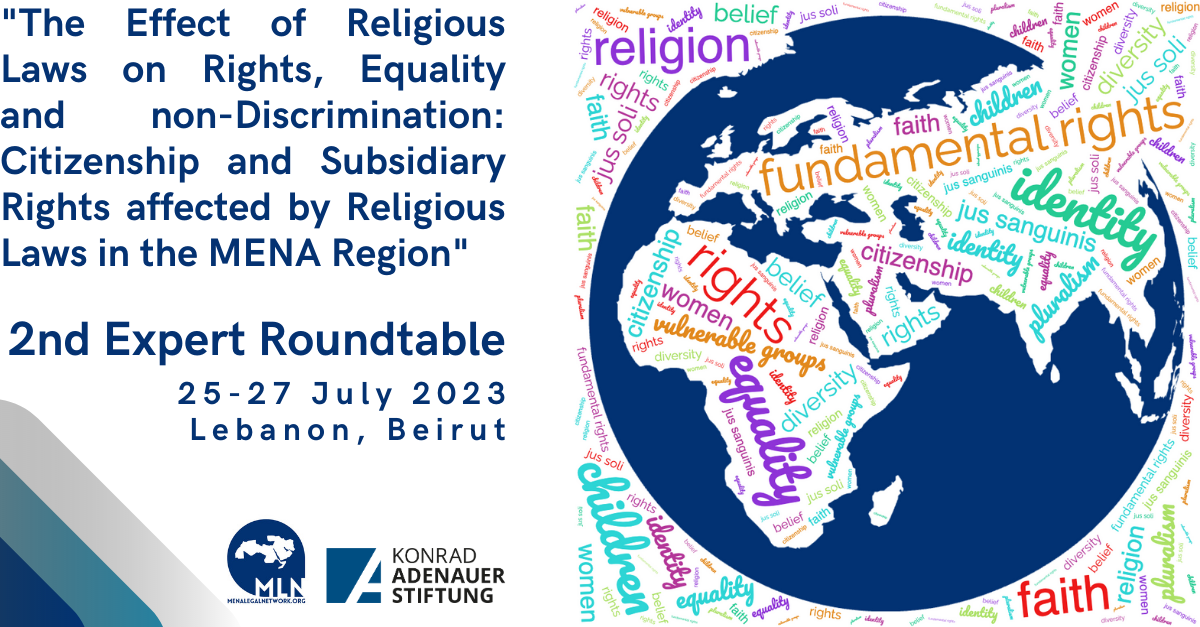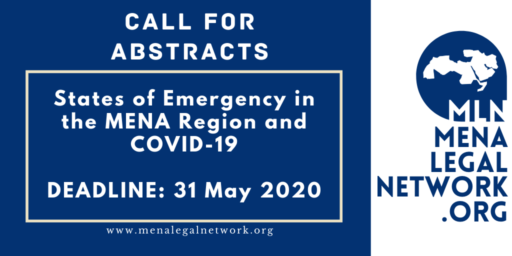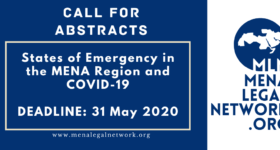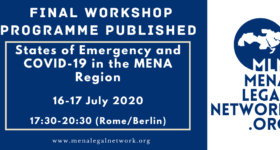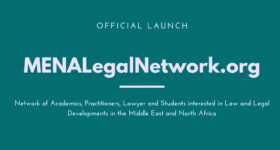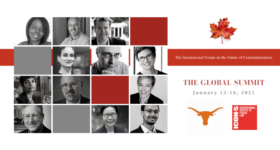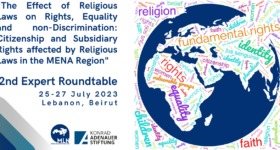“The Effect of Religious Laws on Rights, Equality and non-Discrimination: Citizenship and Subsidiary Rights affected by Religious Laws in the MENA Region”
**NOTE** New Dates and Venue: 25-27 July 2023, Beirut, Lebanon
Organizers: Konrad Adenauer Stiftung Rule of Law Programme Middle East and North Africa and the MENALegalNetwork.org (Prof. Francesco Biagi (University of Bologna), Mr. Islam Khalifa (Central European University), Mr. Siraj Khan (University of Tübingen))
The MENALegalNetwork.org and the Rule of Law Programme Middle East & North Africa will be hosting the 2nd Expert Roundtable on The effect of Religious Laws on Rights, Equality and non-Discrimination: Citizenship and Subsidiary Rights affected by Religious Laws, under the rubric of a series of Roundtables that will explore various dynamics within the overall theme of ‘Boundaries of Religion and Citizenship in the Middle East and North Africa’ (First Roundtable Report).
The Roundtable will take place on 25-27 July 2023, in Beirut, Lebanon, and will take the format of expert papers delivered by selected experts, to be discussed and critiqued by other invited experts in a collegiate exchange among peers and specialists of law, social sciences and politics. The Roundtable will be facilitated by the co-founders of the MENALegalNetwork.org, Dr. Francesco Biagi, Mr. Siraj Khan and Mr. Islam Mohammed.
A background paper for the Second Roundtable has been drafted (see full text and pdf versions below) and provides a precis of the topics we wish to explore in the Second Roundtable.
Contributions will address the themes mentioned in this Background Paper related to ‘The effect of Religious Laws on Rights, Equality and non-Discrimination: Citizenship and Subsidiary Rights affected by Religious Laws’ focusing on a specific country or a comparative analysis of two or more countries in the MENA region from the perspective of domestic laws, legal reforms, using both quantitative and qualitative analyses.
We are particularly interested in papers and contributions that focus on the following challenges and questions from a practical and legal-policy oriented perspective:
- The extent to which domestic laws concerning citizenship and subsidiary rights have undergone reforms – or are currently undergoing reform – and how they compare with regional and international comparative standards on fundamental rights;
- Implementation of religious laws in cases related to citizenship and subsidiary rights;
- The extent to which religious laws impact rules and regulations concerning the right to citizenship by virtue of the nationality of the mother or the father and the origins and development of such laws;
- The extent to which religious laws impact on freedom of religion, belief and conscience;
- Discrimination and discriminatory provisions in domestic laws on citizenship, nationality and subsidiary rights;
- Effects of provisions related to official State religion, or religion of Heads of States, on civil and political rights;
- The effects of religious laws and legal provisions on the principle of equality of citizens in front of the law/courts;
- Discrimination related to personal status laws;
- Discriminatory practices in religious courts;
- Religious Courts: prospects for equality and non-discrimination
Important Information
Deadline for Abstracts: Sunday, 9th April 2023
Please send Abstracts (max. 300 words) to info@menalegalnetwork.org, with a short biography. Please include MLN-KAS Roundtable 2 in the subject line of the email.
Deadline for Papers: Sunday, 28th May 2023
If your Abstract is selected, you will be invited to write a short paper (max. 10-15 pages).
Roundtable Dates: Tuesday, 25th July – Thursday, 27th July 2023
Invited experts and researchers will be invited to attend the Expert Roundtable and present their contribution in person. Travel and accommodation costs for the duration of the Roundtable will be covered by the organisers.
Tentative Logistical Arrangements:
Dates: 25-27 July 2023 (arrival on 24th July 2023; departure on 27th July 2023)
Venue: Beirut, Lebanon
Travel: Economy Return travel costs (most economical return flights) from your home town to the Roundtable venue, including transfers to/from the airport in Tunis, will be covered by the organisers.
Accommodation: 3-nights’ accommodation (Roundtable venue) are covered by the hosts, including a welcome dinner on Monday 24th July 2023; breakfast, coffee break, lunch and dinner on 25th and 26th July; breakfast on 27th July.
Visas: The hosts can provide a letter of support for a visa but cannot bear any responsibility for obtaining a visa.
Honorarium: The hosts will offer a modest honorarium for the written contribution.
We look forward to receiving contributions on relevant topics and are especially interested in receiving abstracts and very much hope that you will be able to join us and look forward to welcoming you to the Roundtable in July 2023.
Yours sincerely,
Francesco Biagi, Siraj Khan and Islam Mohammed – The MENALegalNetwork.org
About the KAS Rule of Law Programme Middle East and North Africa
The Konrad-Adenauer-Stiftung is a political foundation closely associated with the Christian Democratic Union of Germany (CDU). With more than 100 offices abroad and projects in over 120 countries, we make a unique contribution to the promotion of democracy, the rule of law and a social market economy.
The Rule of Law Programme Middle East and North Africa of the KAS, located in Beirut, Lebanon, is one of six regional rule of law programs worldwide managed by the KAS. It is designed as a program of legal dialogue with the aim of promoting the exchange of professional expertise and initiating or constructively accompanying political decision-making processes in the region. The Rule of Law Programme Middle East and North Africa focuses on the following areas:
- Promotion of structures and key institutional elements of the rule of law, such as a functioning constitutional jurisdiction;
- Separation of powers, in particular a professional, effective and independent judiciary and a law-abiding administration that is effectively controlled by independent bodies / courts;
- Protection of fundamental (human) rights in their substantive and procedural dimension;
- Support of regional cooperation instruments that promote rule of law and democracy.
About the MENALegalNetwork.org
The MENALegalNetwork.org was established in 2020 by Dr. Francesco Biagi, Mr. Siraj Khan and Mr. Islam Mohammed, to provide a forum and network of specialists working on law in the wider Middle East and North Africa region to exchange and collaborate on topics of mutual interest related to legal, constitutional and political developments in the region.
The MENALegalNetwork.org launched its first expert workshop on States of Emergency in the MENA Region, during the Covid-19 pandemic, and subsequently organised a panel on the same theme for The Global Summit, University of Texas at Austin, School of Law, organised by The International Forum on the Future of Constitutionalism, in January 2021. Moreover, Dr. Biagi, Mr. Khan and Mr. Mohammed are currently editing a book whose provisional title is “States of Emergency in the MENA Region: Origins, Challenges and Perspectives”.
Background Paper for the 2nd KAS-MLN Roundtable on
Boundaries of Religion and Citizenship in the Middle East and North Africa:
“The Effect of Religious Laws on Rights, Equality and non-Discrimination: Citizenship and Subsidiary Rights affected by Religious Laws in the MENA Region”
25-27 July 2023 (Beirut, Lebanon)
Introduction
Religious law, stoic laws and natural law theories propose that law is natural, divine and therefore binding on humankind without necessarily requiring their consent or participating in the lawmaking process.
The revelation of the Torah to Moses on Mount Sinai, the Gospels revealed to Jesus as recorded by the disciples, and the Qur’an revealed to Muhammad in Mecca and Medina, each contained rules and legal guidance for the public and private lives of followers of these religious traditions. Each of these traditions have had a profound impact on the way that laws and legal traditions have developed over the centuries and millennia across the world. The proponents of each of these traditions advocate that for their respective time and contexts, the religious laws and traditions were revolutionary, oriented towards moral and ethical conduct, justice, and in various ways emancipated their societies from moral autosarcophagy.
Without a doubt, law and religion were indistinguishable to a great extent in pre-modern, traditional societies and many legal theories and frameworks that we apply in the contemporary context can be traced back to the writings of religious scholars and clerics. Significant legal concepts and principles, such as ‘just war’ theory, unlawfulness of slavery, the equality of persons irrespective of economic status and many others find their origins in the writings of religious scholars for whom law and justice formed the bedrock of religious teaching, practice and civic existence and many of which form the cornerstone of modern democratic societies and human rights principles. These legal principles originating in religious scriptures, traditions and laws have survived to our modern contexts in the 21st century, even in the face of competing ideologies contained within the concepts of the nation-state, liberalism, secularism and modernity.
At the same time, the relationship between law and religion has suffered a seemingly irreconcilable divorce. The two no longer accommodate each other as they may once have done. Some have assigned blame to the State’s take-up of religious law and its adoption of religion and religious symbolism as the modus operandi of the business of state and governance. By way of historical examples, the Christian Empire’s abuse of Christian law and Muslim Empires’ abuse of Islamic law both contain examples of malfeasance in the application of the law for sinister personal, political and partisan objectives, rather than for the higher objectives of justice, emancipation and the moral, ethical and spiritual progress of their societies, as was claimed.
The effects of the French Revolution (1789-1799) and the resulting break of civil society from the effects of religion on public life through limiting the role of the church on governance and law arguably set Europe on an irreversible path towards secularism in governance and in law. However, the effects of the revolution were perhaps more far reaching as the nation-state concept was forced upon countries beyond Europe, largely through European colonisation.
The recent decade has witnessed a seismic shift in the relationship between religious and secular laws and has therefore also resulted in a change in the dynamics and relationship between religious actors with state, political and judicial actors and with the state in general.
The break between religion and the State was perhaps incomplete, so far as religious actors were still allowed to operate on a delegated basis and still maintained some role in the affairs of governance, although drastically reduced as compared with their historical role. In many countries in the MENA region, however, the state went beyond merely co-opting religious actors, but the strength of religious movements, and perhaps added to by the symbiosis of pan-Arab nationalists and pan-Muslim movements with religious movements and political-Islamist movements strengthened the position of Muslim institutions in affairs of law and governance. As a result, various models of the role of religious actors and religious law in matters of state and governance emerged, each with varying degrees of delegated authority: al-Azhar in Egypt, Zaytouna in Tunis, Qarawiyyin in Morocco, the lineage, descendancy and role of the Kings of Morocco, Saudi Arabia and Jordan (especially in regards to the sacred sanctuaries of the Ka’ba and the al-Aqsa Mosque), Qom in Iran (and the doctrine of the Vilāyat-i-Faqīḥ – the Authority of the Jurist). Some of these institutions had a formal, constitutional and codified role in matters of law-making, interpretation of laws and governance in their respective societies, and some like al-Azhar even had influence in other Muslim-majority countries due to their influence and authority in Sunni Islam.
In recent years, undoubtedly catalysed by the Arab Spring revolutions in which the concept of civil and political rights, sovereignty and the authority of the people against unelected leaders was a central feature, civil and political rights have taken center stage in how law, governance and society are perceived. As a result, the question of how law is made and who makes it has come to the foreground. The role of representative legislative structures and processes and the role of religious authorities in the legislative process has become of greater importance, such that many constitutions have since reduced the role of unelected clerical and religious bodies in the legislative and judicial process. In many constitutional frameworks, the role of religious authorities was reduced to a consultative one, rather than a binding or approving function.
This in turn has resulted in the amendment and repeal of many laws that were previously imposed or approved by religious authorities that were claimed to have been derived from religious law. Legislative and political institutions have – often unilaterally – and without consulting religious authorities, overwritten laws that codified religious laws – such as aspects of Muslim family law and Islamic Criminal Law.
This relatively recent phenomenon represents an acknowledgement of the role of legislative and judicial organs over that of religious organisations and is a marked change in the institutional relationship between the legislative, judicial and religious institutions in Muslim majority countries. A similar development is observed in countries in the region with a pluralist legal system and those in which there is a greater representation of non-Muslims in both state institutions and in society, such as in Jordan and Lebanon. Also in these countries, religious institutions are seeing their roles increasingly weakened.
The responses to each of these developments has been extremely varied. In Jordan, the Courts and the State seem to have taken a clear stance against the rising popularity of Islamist political movements, as seen in the recent case of the dissolution of the Muslim Brotherhood as a political party and the requisition of their property – a clear message on the role of religious actors in the State. In Saudi Arabia, there has been a relatively broad relaxation of rules for non-Muslims living, working or visiting the Kingdom – again a vast move away from the historical practice of rules applicable to non-Muslim minorities in the Kingdom. The United Arab Emirates has introduced special courts for non-Muslims and has legalised civil marriages for non-Muslims in the Emirates – a huge step towards equality towards non-Muslim residents and workers.
In the last decade and more, Morocco, Egypt, Tunisia and Sudan have all recently issued laws or entered into political and transitional agreements that formally subject religious law and generally legal rules pertaining to ‘personal status laws’ (qawānīn aḥwāl al-shakhṣīyya) to the constitution, international human rights treaties related to civil, political and equality rights and to a commitment to establish civil-states, as opposed to religious states.
Some of the constitutional developments brought about by the Arab Spring revolutions included the rejection of Islam or the Shari’a as a source of legislation in Tunisia’s 2014 Constitution, as initially advocated by some political parties, whilst retaining the provision referring to Islam as the religion of Tunisia (Art. 1 of the 2014 Constitution).[1] The Egyptian Constitution 2014 (revised 2019) retains Art. 2 from the 1980 Constitution,[2] which holds Islam as the religion of the State and the principles of Shari’a as the principal source of legislation, significantly strengthening its effect compared with Art. 2 of the 1971 Constitution which held the principles of the Shari’a to be a main source of legislation.[3] At the same time, it controversially introduced the role of al-Azhar as the main authority for religious sciences and Islamic affairs (Art. 7, 2014 Egyptian Constitution (rev’d 2019)). The 2011 Constitution of Morocco[4] and the 1952 (amended 2016) Constitution of Jordan[5] include provisions related to the role of the King as a Muslim male through hereditary succession, both of whom claim descendancy through the prophetic lineage. Art. 2 of the Jordanian Constitution specifies Islam as the religion of the State and Art. 99 includes provisions related to the operation of Religious Courts (for Muslim, Christians and other religions). Art. 1 of the Moroccan Constitution mentions the reliance of the State on the Muslim religion, Art. 3 mentions Islam as the religion of the State, Art. 41 highlights the role of the King as “Commander of the Faithful” (Amir Al Mouminine), and Art. 175 prevents the amendment of any laws that infringe the provisions related to Islam. Notwithstanding these provisions, both the Jordanian and Moroccan constitutions have given precedence (at least to a certain extent) to international human rights treaties over domestic law, and judicial decisions by the Constitutional and Supreme Courts in both constitutional monarchies (Jordan and Morocco) have arguably confirmed this, to an extent.[6] In the Sudanese transitional process, the Prime Minister of Sudan signed an agreement on 3rd September 2020 with the Sudan People’s Liberation Movement-North to establish a system of governance “based on the separation of religion and state” and that the “state shall not establish an official religion”.[7]
This brief and sporadic snapshot illustrates a number of questions that deserve to be probed further, which may include the changing relationship between religious actors and state institutions, the waning role of religious actors in matters related to lawmaking, the sometimes ambivalent provisions related to the codification of principles of Islamic Law and the potential utility of Islamic law and its principles on judicial interpretation.
The Second Roundtable
More than 80 countries around the world specify preference for an official religion of the State.[8] Of these, approximately 27 States specify Islam as the official religion of the State, and around 13 specify Christianity or a specific Christian denomination as the State religion. More than 40 States unofficially favour and give preference to a particular religion, usually a branch of Christianity.
Whilst specifying a religion or faith as the official religion of the State may not be problematic in itself, there is empirical evidence to suggest that this results in preferential treatment or, worse, discrimination against people who belong to another faith or none, thereby establishing rights based on adherence to, and identification with, a specific religious tradition. This means that principles such as equality of all citizens before the law and protections against non-discrimination are severely diminished, and civil and political rights, private and family rights and rights to identity and citizenship may directly be affected as a result of identifying with a specific faith or religion.
The way that States treats citizens that identify with the official religion of the State, or of the institutions of that religion, may also result in multiple tiers of benefits, exemptions or preferential treatment for such institutions and their members.
Subsidiary rights can also be affected due to an official or unofficial policy towards religion, or against those who follow certain religious traditions, even in countries that do not have an official State religion or that claim to be secular. In Europe, for example, the French Government restricted religious practice and freedom by issuing a ban on the face-veil in public and government buildings, directly aimed at a small percentage of Muslim women who donned the face-veil. This has had the result that Muslim women wearing face-veils are naturally disqualified from holding public offices and positions in governmental establishments. Similarly, in Germany, the wearing of religious symbols is not permitted for those exercising public offices, such as magistrates and judges, with the result that wearing items that are religiously prescribed, such as the kippa for Jewish men, the hijab for Muslim women, the cross for Christians, and the turban for Sikh men, would disqualify a person from being appointed as a judge in Germany.
Similarly, many countries in the MENA region that identify an official religion or religions of the State, of the heads of State. This clearly infers a preference for that religion – albeit limited to formal aspects of leadership of the State or of the main political institutions – but the effects of these provisions often trickle down to the societal level and thereby affect law and policy.
While there are very few States that bind citizenship of that State to its official religion (Saudi Arabia, Comoros Islands, Maldives and Mauritania), other States officially recognise certain religions and exclude others. This often has a direct or indirect effect on restricting the right of persons following other non-recognised religions from proselytization, publication, public expression, conversion and official recognition on identity documents (Egypt, Iran, Saudi Arabia). More crucially, it may affect their right to citizenship, especially where citizenship is linked to adherence to a faith or specific religious tradition. This aspect is also rapidly changing – especially in the MENA Region. Saudi Arabia recently amended the regulations regarding to allow Saudi nationality for children born to a Saudi woman and a foreign father,[9] after reaching the age of 18, as long as they meet the requirements of good behaviour (absence of serious criminal or moral offences) & familiarity with Arabic language, among others.
This Roundtable invites contributions to identify the effects of religion on civil and political, rights, equality in front of the Courts and discriminatory provisions in laws and policies, where adherence (or non-adherence) to an official religion or faith renders unfair and unequal treatment to citizens from the State and its organs. This can also include serious effects on subsidiary rights, such as the presumption that a child born of parents belonging to different religions will follow the religion of the father and not of the mother, guardianship and custody of children where the parents each identify with a different religious tradition, and discrimination based on these and related grounds. We also invite contributions on how official recognition and promotion of a religion or religions negatively affects the right of citizenship and identity directly, especially for religious minorities and followers of faiths that are not recognised as official ‘religions’ by the State.
Notes:
[1] See: Art. 2, Constitution of Tunisia (2014), here: https://www.constituteproject.org/constitution/Tunisia_2014?lang=en (accessed 12.01.2022); D. Pickard, ‘The Current Status of Constitution Making in Tunisia’,
https://carnegieendowment.org/2012/04/19/current-status-of-constitution-making-in-tunisia/ah1s (accessed 12.01.2022)
[2] See: Art. 2, Constitution of Egypt (1980), here: https://manshurat.org/node/1689 (accessed 29.01.2022)
[3] See: Art. 2, Constitution of Egypt (1971), here: https://manshurat.org/node/1688 (accessed 29.01.2022)
[4] Constitution of Morocco (2011), https://www.constituteproject.org/constitution/Morocco_2011?lang=en (accessed 12.01.2022)
[5] Constitution of Jordan (1952, amended 2016) https://www.constituteproject.org/constitution/Jordan_2016?lang=en (accessed 12.01.2022)
[6] See for Instance: Interpretative Decision No. 6 of 2013 of the Constitutional Court of Jordan, on the 2012 Draft Law of the Syndicate of Imams and Workers in Islamic Endowments (Awqāf) Institutions, in which the Court interpreted the provisions of the draft law in light of international human rights treaties for the purpose of declaring that they have a right to stablish labour unions and syndicates. The Court stated that: “International covenants and treaties support the freedom to form trade unions, including what is stated in Art.23(4) of the Universal Declaration of Human Rights of 1948, Art. 22 of the ICCPR 1966 and Art. 8(b) of the ICESCR 1966…” (See here for original Decision in Arabic: Official Gazette, p.4114)
Similarly, in Decision No. 4 of 2017, the Constitutional Court of Jordan, in their decision regarding a challenge on the unconstitutionality of the law of the Bar Association, based their decision on international treaties. It stated: “The texts of Articles 46 and 52 of the Law of the Bar Association are in harmony with what is stated in the Constitution, in letter and in spirit, and are additionally consistent with international agreements and charters, especially the main principles of the Charter of the United Nations regarding the role of lawyers…” (See here for original Decision in Arabic: Official Gazette, p.4670)
Decision No. 1413 (2007) issued by the Shari’a Chamber of the Court of Appeal in Casablanca, Morocco, concerning the application of personal status laws, stated: “Whereas the international treaty is a special law having precedence over national law, in this case the Personal Status Law and Family Law, which are public laws, and that according to the principle of supremacy of these treaties over the national law confirmed by the Supreme Council in its Decision No. 754 dated 05/19/1999 in the commercial file no. 4356/1990 published in the Supreme Court Council Magazine Issue no. 56.”
[7] See scanned document here: https://twitter.com/hiba_morgan/status/1301655638007832577?s=20
[8] Report by Pew Research Center, Oct. 3, 2017, “Many countries favor specific religions, officially or unofficially”
https://www.pewresearch.org/religion/wp-content/uploads/sites/7/2017/09/FULL-REPORT-FOR-WEB.pdf (accessed 10 March 2023)
[9] The Regulation on Citizenship of Saudi Arabia 1374 (Hijri year, corresponding to 2023), amended in accordance with the Decision of the Council of Ministers No. 3 of 1347 (2023).


